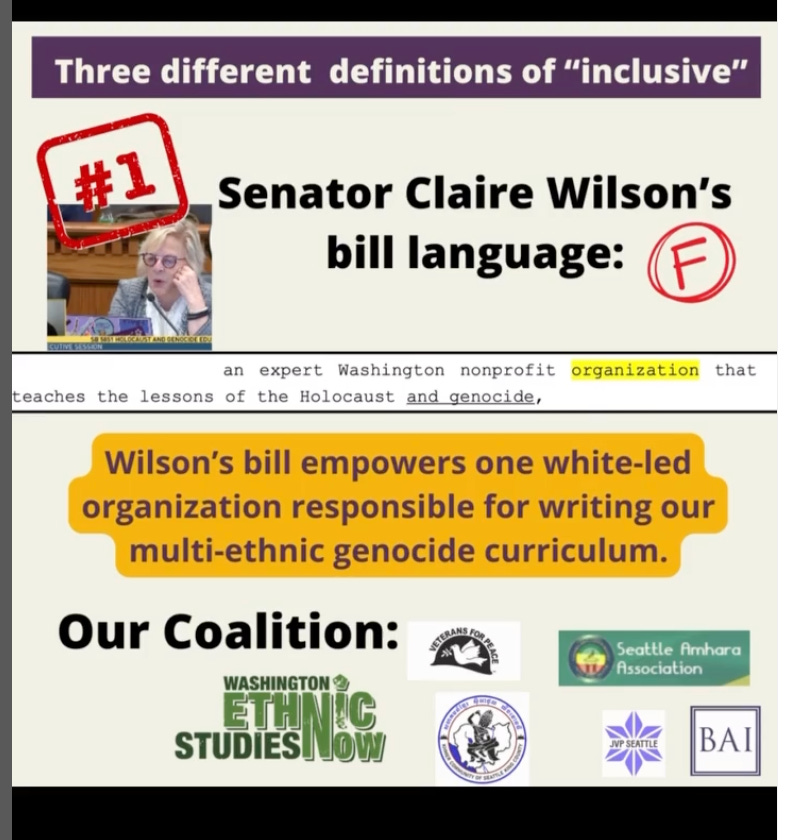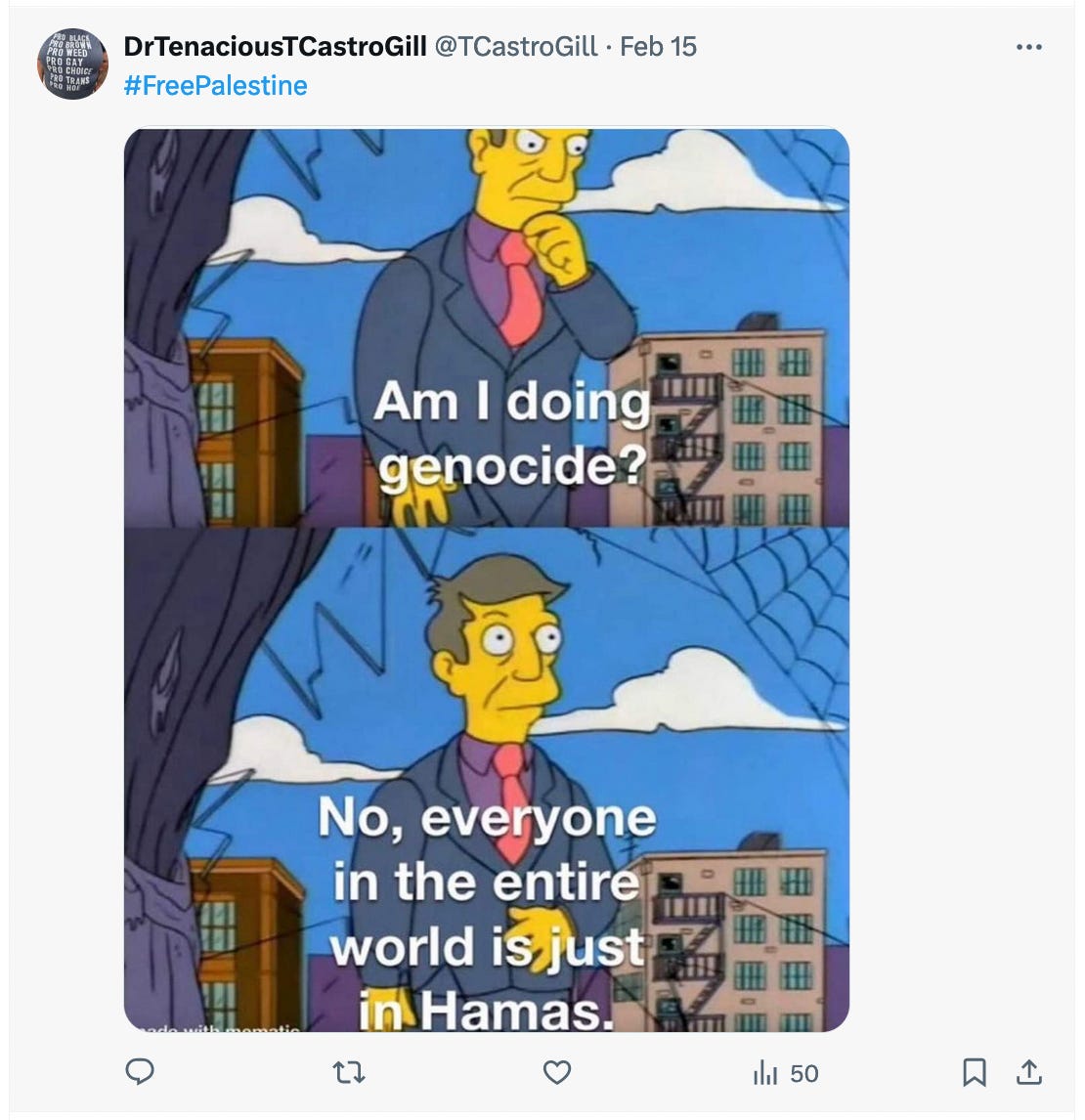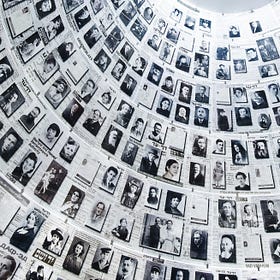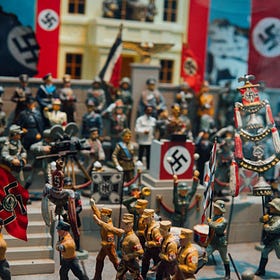At a time of increased anti-Semitism, when many Jewish Americans are afraid to disclose their identities in modern, progressive cities, a bill to mandate Holocaust and genocide education to K-12 students in Washington state is dead.
Senate Bill 5851 and House Bill 2037 faced opposition and revisions before failing to advance last week.
That the bill failed is not the biggest problem. The Holocaust Center for Humanity will continue working with schools, and as both executive director Dee Simon and JCRC director Max Patashnik noted, a dead bill is better than a bad bill.
The problem is how it went down, and what it might portend for the future.
Introduced by Sen. John Braun (R-Centralia), the bill had little input and partnership from the Jewish community from the outset. On the level of best intentions, the bill, which came out after October 7th, was a gesture of allyship meant to fight anti-Semitism. But the lack of partnership and short runway left the Holocaust Center for Humanity and its close friends, like the JCRC, with little time to strategize.
Had this been any other year, despite these challenges, the bill likely would have sailed through the legislature. Who wouldn’t want schools to educate about a genocide that changed the world and can serve as a lens to understand crimes against humanity now and into the future? But the bill’s connection to fighting anti-Semitism after the October 7th massacre opened the door to an opposition movement that called for the bill to be more inclusive of other genocides.
This, despite the intention of the original Senate bill:
The studying of this material is intended to: Examine the ramifications of prejudice, racism, and intolerance; prepare students to be responsible citizens in a pluralistic democracy; and be a reaffirmation of the commitment of free peoples never again to permit such occurrences.
“I think there was a lot of information spread by people who had no information and had assumptions and spoke to legislatures about things that were not accurate and true,” says Simon.
Those people with assumptions and no information were mostly from the ethnic studies lobby, led by Washington Ethnic Studies Now (WAESN). WAESN, which is beset by challenges to its agenda and funding, sunk its fangs into this bill. WAESN activated other groups, including CAIR, the Bosnian American Institute, Coalition Of Immigrants, Refugees and Communities of Color (CIRCC), the Rwandan Community Association of Washington, and others, to either oppose the bill or require amendments to include other genocides besides the Holocaust.
Why? For one, WAESN was apparently operating under the false idea that the Holocaust Center for Humanity would be the recipient of millions of dollars of funding and wanted a piece of the pie. (The money would have gone to educators through OSPI.) In a message supporting WAESN, CAIR claims that “Currently, the Legislature directs OSPI to partner with a single organization to develop this curriculum. That organization has already received $183,000 in state funds, is slated to receive $750,000 in 2024 and another $750,000 in 2025, and is requesting an additional $597,000 for the next 6-year period through this bill’s fiscal note.”
That “single” organization is the Holocaust Center for Humanity. The CAIR email goes on:
How comprehensive and inclusive can this bill be when only one organization is contracted to provide this vital education?
WAESN, an expert organization in curriculum development with a focus on ethnic studies, has convened a workgroup that brings together diverse perspectives from communities in Washington that have experienced genocide. We are emailing legislators to let them know a diverse and growing group of communities and individuals in Washington State want changes to this legislation to make it more inclusive and equitable.
WAESN, in typical form, asserted on social media that the Holocaust Center is a “white-led organization” that seems to be taking ownership of “their” “multi-ethnic genocide curriculum.”
The Holocaust Center for Humanity already partners with other community groups and is well versed in pedagogical approaches to genocide studies.
“Without this bill, how are the other genocides going to get into the schools? Ethnic Studies has no expertise in the area,” says Simon. “We have been looking for documentation and resources for other genocides and there’s none available. That’s why Holocaust museums are creating them. Because they don’t exist.”
There’s something even more sinister than WAESN wanting to siphon funding or claiming to have more expertise. WAESN has time and again flirted with anti-Semitic tropes, like the idea that white, powerful Jews are silencing noble, downtrodden people of color. Perhaps they imagine that the Holocaust Center for Humanity is in cahoots with OSPI to control the message within Washington schools and to ensure that the Holocaust remains the most important genocide and to shut down criticism of Israel (and is getting paid to do so, too).
WAESN is also decidedly anti-Zionist. “The fact that the bill…was painted as a response to October 7th, that got up the antenna from the far left,” says Patashnik. Once she saw WAESN sign in to testify against the bill, “it kind of snowballed from there.”
“There’s this complete lack of education, and there’s malice too,” Simon adds. “Anti-Semitism exists beneath the surface and always has and always will. Nazi Germany just watered the preexisting seeds of anti-Semitism. Hamas did that too.”
It’s ironic that a bill to mandate education about the Nazi genocide was so vehemently opposed by people on the far left who are always talking about Nazis. And now there is no bill to mandate education about any community’s genocide.
Patashnik is concerned about the Jewish community becoming a political football, and how this could play out in the next election. “Not only did the bill fail, but also the Jewish community is in a bad place by everyone around us using Jews for their agenda.”
However, Simon is clear that anti-Semitism is not the cause of the bill’s failure. The bill had significant support from both sides of the aisle and the Washington Education Association. The problem is getting people to stand with the Jewish community and rise above the noise.
“I would say that we have a real problem in getting the majority of people to speak out and be allies with us,” she says. “When I go to these events to fight anti-Semitism, the people in the room are all Jewish. Jews believe that somehow logic and facts and truth will win out in the end, and what we’re learning is the loudest voices are heard more than logic.”
Further reading:
Should Holocaust Education Be Required?
Over the past two weeks, more than 1,000 people came out to support Senate Bill 5851 and House Bill 2037, which if passed will mandate Holocaust education in Washington state schools by 2027-28. The bills build on past legislative successes heralded by the Jewish community and the Holocaust Center for Humanity, the state’s only Holocaust museum and educa…
Washington Ethnic Studies Now Has a Jewish Problem
Anti-Semitism successfully turns Jews into the symbol of whatever a given civilization defines as its most sinister and threatening qualities. When you look through this dark lens, you can understand how, under communism Jews were the capitalists. How under Nazism, Jews we…
Does Substack Have a Nazi Problem?
Does Substack have a Nazi problem? This concern, raised by journalist Jonathan Katz in an article in The Atlantic, accuses this platform of allowing white supremacists to spew their ideas, find and harbor community, and raise money. I don’t want Nazis on Substack. I don’t want Nazis anywhere. But I’m also becoming a free speech absolutist, worried less …
Community Announcements
Check out the Seattle Jewish community calendar.
Check out ways to support Israel through UNX (UnXeptable) Seattle.
Candlelighting in Seattle is at 5:26 p.m. The parasha is Tetzaveh.
Did you know you can become a Brisket level Cholent subscriber? This is a great opportunity for organizations. Support local Jewish journalism and get six banner ads a year for your events! Thank you, Stroum Jewish Community Center, for going Brisket!
Shoutouts
Steve Sarkowsky’s band is playing the Triple Door tonight! Kudos to Steve!!! —Jeremy Miller
Mazel Tov to Briana Holtzman and Solly Kane on the delivery of their beautiful son, Ari! —Nancy Greer
Shoutout to Max Patashnik, Aliza Mossman, Cassie Garvin, and Perri Doll from the JCRC for their incredible work putting together the Jewish Community Lobby Day in Olympia on Feb 15. It was amazing seeing over 80 members of the community connect with their legislators and share the priorities of the Jewish community in our state's capitol. Well done. —Hannah Lidman









Excellent article.